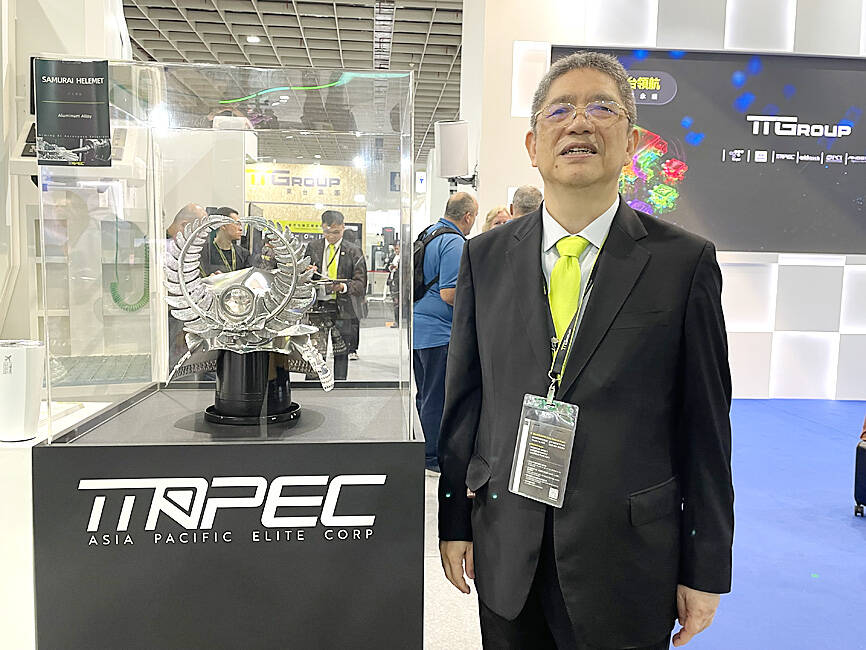Machine toolmaker Goodway Machine Corp (程泰機械) plans to start manufacturing in the US and expand its operations in southern California as early as the second half of this year if US President Donald Trump imposes reciprocal tariffs of more than 20 percent on Taiwan, chairman Edward Yang (楊德華) said yesterday.
The company, which has been deeply involved in the US market for more than 30 years, has a distribution base in Ontario, California, focusing on after-sales service, and has acquired 5,000m2 to 6,000m2 of land there, Yang said.
The company also has nearly 60 distribution partners in North America, a well-developed distribution network that would pave the way for manufacturing in the US, he said.

Photo: CNA
Yang made the remarks on the sidelines of the Taipei International Machine Tool Show (TIMTOS), which opened yesterday and runs through Saturday at the Taipei World Trade Center’s Exhibition Hall 1 and the Taipei Nangang Exhibition Center.
“If Trump pushes for 10 to 20 percent reciprocal tariffs on all goods imported into the US, it is expected to put Taiwanese firms on equal footing, as all players would face the same challenge and Goodway might opt to raise prices to cope with the situation,” the Central News Agency quoted Yang as saying at the Taipei Nangang Exhibition Center. “But if the tariff rates exceed 20 percent, there would be a basis for us setting up factories in the US, given our early-mover advantage in the US market.”
Commenting on the challenges of the industry, Yang said Taiwanese toolmakers face strong competition from Japanese and German rivals in the high-end market, while Chinese and Indian peers have been catching up quickly with competitive prices.

Photo: CNA
Against that backdrop, local firms must upgrade their technology and services, and launch products that exceed foreign makers in quality and price, he said.
Looking ahead, Trump’s tariffs would have a significant effect on the industry, but the situation would become clearer after the second quarter, Yang said.
Meanwhile, Tongtai Machine and Tool Co (東台精機) expects better order visibility for the industry in the second half of the year after a potential end of Russia’s war in Ukraine and the finalization of the White House’s tariff policy, chairman Yen Jui-hsiung (嚴瑞雄) said.
The end of the war in Ukraine is bound to bring a wave of infrastructure and reconstruction business opportunities, Yen said.
In addition, Europe would also increase its defense spending in response to Trump’s US foreign policy, which is expected to bring new opportunities to the machine tool industry, he added.
Regarding the emerging innovation of humanoid robots, he said Taiwanese toolmakers could focus on key components needed for the machines to move, such as harmonic drives, planetary gearboxes and ball screws.
However, Chinese makers have been developing key components for humanoid robots based on a foundation built by years of electric vehicle development, and their competitiveness should not be underestimated, he said, adding that the US and China have become strong leaders in humanoid robots.
This year’s TIMTOS attracted more than 1,000 manufacturers to set up 6,100 booths during the six-day event, a record in terms of scale.
Highlighting “artificial intelligence and robots” as a core theme for the first time, the event is expected to attract more than 50,000 domestic and foreign visitors, as well as 4,000 buyers, the organizers said.

Intel Corp chief executive officer Lip-Bu Tan (陳立武) is expected to meet with Taiwanese suppliers next month in conjunction with the opening of the Computex Taipei trade show, supply chain sources said on Monday. The visit, the first for Tan to Taiwan since assuming his new post last month, would be aimed at enhancing Intel’s ties with suppliers in Taiwan as he attempts to help turn around the struggling US chipmaker, the sources said. Tan is to hold a banquet to celebrate Intel’s 40-year presence in Taiwan before Computex opens on May 20 and invite dozens of Taiwanese suppliers to exchange views

Application-specific integrated circuit designer Faraday Technology Corp (智原) yesterday said that although revenue this quarter would decline 30 percent from last quarter, it retained its full-year forecast of revenue growth of 100 percent. The company attributed the quarterly drop to a slowdown in customers’ production of chips using Faraday’s advanced packaging technology. The company is still confident about its revenue growth this year, given its strong “design-win” — or the projects it won to help customers design their chips, Faraday president Steve Wang (王國雍) told an online earnings conference. “The design-win this year is better than we expected. We believe we will win

Chizuko Kimura has become the first female sushi chef in the world to win a Michelin star, fulfilling a promise she made to her dying husband to continue his legacy. The 54-year-old Japanese chef regained the Michelin star her late husband, Shunei Kimura, won three years ago for their Sushi Shunei restaurant in Paris. For Shunei Kimura, the star was a dream come true. However, the joy was short-lived. He died from cancer just three months later in June 2022. He was 65. The following year, the restaurant in the heart of Montmartre lost its star rating. Chizuko Kimura insisted that the new star is still down

While China’s leaders use their economic and political might to fight US President Donald Trump’s trade war “to the end,” its army of social media soldiers are embarking on a more humorous campaign online. Trump’s tariff blitz has seen Washington and Beijing impose eye-watering duties on imports from the other, fanning a standoff between the economic superpowers that has sparked global recession fears and sent markets into a tailspin. Trump says his policy is a response to years of being “ripped off” by other countries and aims to bring manufacturing to the US, forcing companies to employ US workers. However, China’s online warriors